| Reviews & Columns |
|
Reviews DVD TV on DVD Blu-ray 4K UHD International DVDs In Theaters Reviews by Studio Video Games Features Collector Series DVDs Easter Egg Database Interviews DVD Talk Radio Feature Articles Columns Anime Talk DVD Savant Horror DVDs The M.O.D. Squad Art House HD Talk Silent DVD
|
DVD Talk Forum |
|
|
| Resources |
|
DVD Price Search Customer Service #'s RCE Info Links |
|
Columns
|
|
|
I'd Climb The Highest Mountain
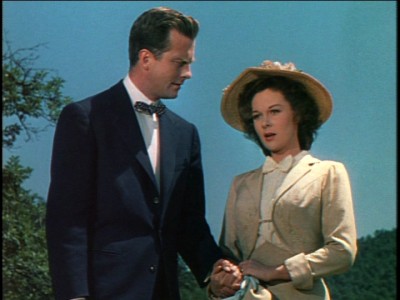
The Movie:
Wholesome as apple pie, the 1951 melodrama I'd Climb the Highest Mountain follows the episodic doings of a Methodist preacher and his new wife as they settle in a rural Southern town in the 1910s. Although the film is sweetly nostalgic and well-crafted, non-believers need to be aware that this is one movie which preaches an extremely dogmatic view on religion and Christianity. Watching it actually made this Crunchy Granola Liberal Agnostic uncomfortable - like Leo McCarey's virulent anti-Commie howler My Son John, this seemingly benign movie is a definite byproduct of the rigidly conformist '50s.
Based on the widely-read 1910 book A Circuit Rider's Wife by Corra May Harris, I'd Climb the Highest Mountain strives for a folksy authenticity. While it does get heavy-handed and oppressively preachy, director Henry King (The Song of Bernadette) evocatively sets the tone in the opening scenes. The idealistic Reverend William Thompson (William Lundigan) and his newly wed, city-bred spouse, Mary Elizabeth (Susan Hayward) arrive at a rural community in North Georgia so the reverend can take over running the local Methodist church. He's playful, boyish and supremely confident; she's a realist who is constantly up against situations which test her faith. What Mary Elizabeth views as random acts of tragedy, William greets as a challenge and evidence of God's will.
Although the villagers are welcoming of the reverend and Mrs. Thompson, most of the drama in I'd Climb the Highest Mountain comes from William's desire for the townspeople to change their casual attitude toward the church as a simple place for socializing. In his first Sunday sermon, he persuades all the congregation's married couples to stand up and renew their wedding vows - and that's only the beginning! The couple manage to ingratiate themselves with everyone in the town - whether they already belong to the church or not. Inspirational, or annoying? I tend to think the latter, although in its favor the film is populated with a variety of finely-written characters played by solid actors such as Gene Lockhart, Ruth Donnelly, Lynn Bari and Rory Calhoun. Alexander Knox (Wilson) makes an especially vivid impression as the stony patriarch of the one non-devout, non-observational family in the area. The reverend has his work cut out for him, as the community experiences an attack from a deadly virus, an unforeseen tragedy involving one of the local kids, and Mary Elizabeth's pregnancy not coming out as expected.
Even today, I'd Climb the Highest Mountain is widely praised by religious audiences as a heartwarming, realistic ode to the power of faith and the self-sacrificing ideals of Christianity. Filming in an actual rural Georgia town added to the movie's picturesque authenticity, yet the script clings to a '50s philosophy of "conform, or suffer the consequences." Its views on religion are idealistic, yet bizarrely King and screenwriter Lamar Trotti chose to emphasize the qualities in the devout which modern viewers will recognize as clichés. Face it, these folks are morally superior, sanctimonious busybodies. It also depicts a weirdly myopic world - there's no indication of non-Methodist religions or non-white ethnicities in the town (not even a black extra to be seen), and the few "different" characters are seen as outcasts. The film attempts to give a fair shake to the sole atheist couple, although it's no coincidence that they live in a filthy hovel with an off-kilter family dynamic, the meek wife (uncredited actress Jean Inness) being steamrolled by the husband while the reverend handily tempts their kids with candy and toys. I especially despised the treatment of Mary Elizabeth, despite Susan Hayward's best efforts to make her interestingly flawed. The character starts out as a feisty skeptic, but by the film's conclusion she's softened into a docile creature who comes to believe that God's plan for her is to support her husband, no matter what. In the end, the reverend and his wife leave the township with all the residents smiling and waving like brain-dead masses - whether you view this scenario as "happily ever after" or "I want to gouge my eyes out with dull-tipped pencils" depends on your eventual enjoyment of the rest of the picture.
Similar to many current films courting (or exploiting, depending on your view) the faith-based market, I'd Climb the Highest Mountain has a strong "preaching to the choir" vibe which fails to challenge or even acknowledge anything outside its own stick-straight ideology.
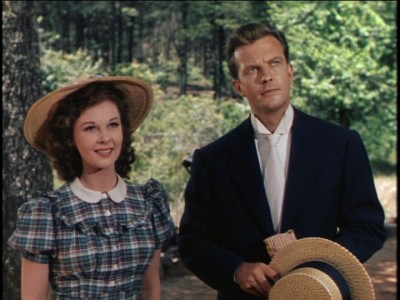
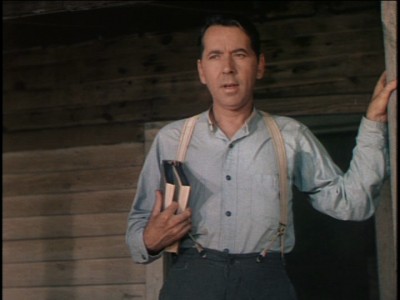
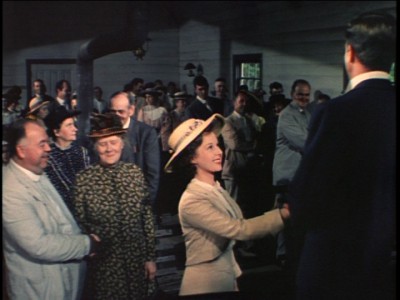
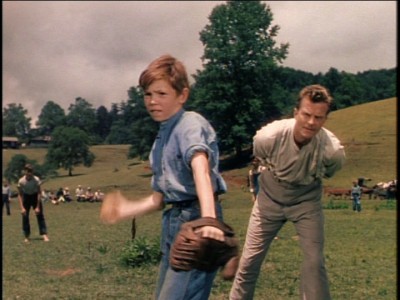
The DVD:
Video:
Fox has included a disclaimer on its made-on-demand DVD edition of I'd Climb the Highest Mountain explaining that the picture has been manufactured from the best available materials. That ought to serve as a red flag, yet the image actually fares a little better than other color Fox m.o.d.'s I've reviewed. The 4:3 picture is softened and appears to be from a yellowed, second-hand source. Dust and flaws are constant, and darker side of the spectrum appears overly murky.
Audio:
The mono soundtrack, somewhat fuzzy at times, is a satisfactory listen with decent levels between dialogue and music and not too much distortion. No subtitles are included.
Extras:
None. As with other Fox Cinema Archives discs, the disc sports a simple menu and chapter stops every ten minutes in the film.
Final Thoughts:
Like preachy movies? By all means, check out 20th Century Fox's wholesome 1951 production I'd Climb the Highest Mountain. This bucolic tale of a youthful preacher and his wife in 1910s rural Georgia falls in line with other considerately crafted yet message-heavy efforts from the gifted director Henry King. It does its own sanctimonious thing pretty well, although the grating, dogmatic ideas it shovels out may well drive even the most casual of non-Christians batty. Rent It.
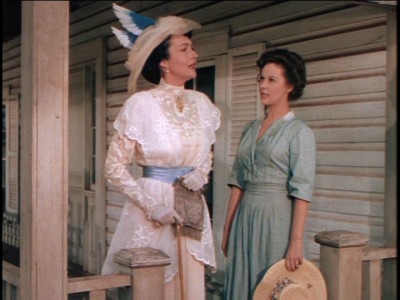
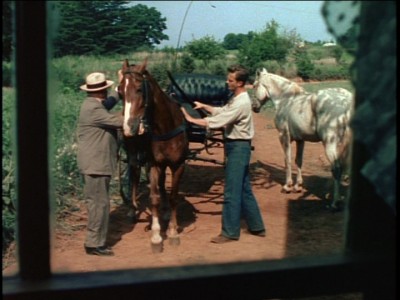
Matt Hinrichs is a designer, artist, film critic and jack-of-all-trades in Phoenix, Arizona. Since 2000, he has been blogging at Scrubbles.net. 4 Color Cowboy is his repository of Western-kitsch imagery, while other films he's experienced are logged at Letterboxd. He also welcomes friends on Twitter @4colorcowboy.
|
| Popular Reviews |
| Sponsored Links |
|
|
| Sponsored Links |
|
|
| Release List | Reviews | Shop | Newsletter | Forum | DVD Giveaways | Blu-Ray | Advertise |
|
Copyright 2024 DVDTalk.com All Rights Reserved. Legal Info, Privacy Policy, Terms of Use,
Manage Preferences,
Your Privacy Choices | |||||||













